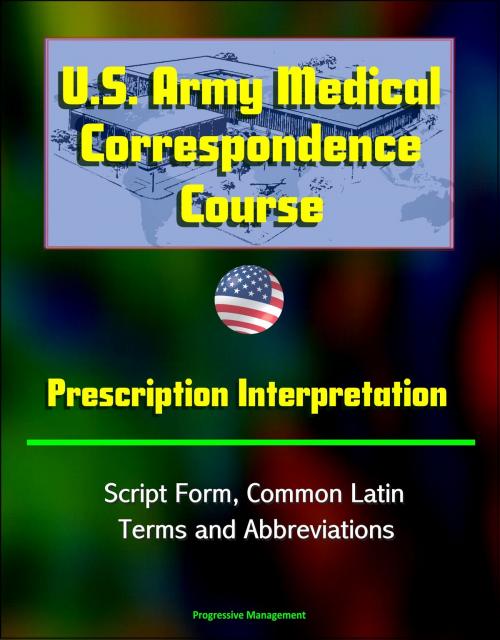U.S. Army Medical Correspondence Course: Prescription Interpretation - Script Form, Common Latin Terms and Abbreviations
Nonfiction, Health & Well Being, Medical, Specialties, Pharmacy| Author: | Progressive Management | ISBN: | 9781310749131 |
| Publisher: | Progressive Management | Publication: | October 18, 2014 |
| Imprint: | Smashwords Edition | Language: | English |
| Author: | Progressive Management |
| ISBN: | 9781310749131 |
| Publisher: | Progressive Management |
| Publication: | October 18, 2014 |
| Imprint: | Smashwords Edition |
| Language: | English |
The prescription is a vital link between the physician and pharmacy personnel. The prescription states the drug and the dose of that drug the patient must receive. If the prescription is not properly interpreted, the patient could suffer injury or death. Therefore, it is necessary for you to understand the different parts of a prescription and the terminology associated with the prescription.
Prescription Interpretation is the first subcourse in the Pharmacy Specialist Program. The skills and knowledge you gain from reviewing/studying the material in this subcourse will serve you as you complete other subcourses and as you work on the job.
This subcourse is composed of four parts. Part one consists of a pretest that gives you the opportunity to identify your specific learning needs in relation to prescription interpretation. Depending upon how you perform on the pretest, you can proceed to one of the three remaining parts of the subcourse. These parts are written in the programmed text format. Part two discusses the prescription blank (DD Form 1289) in detail. Part three presents the language of the prescription: pharmaceutical Latin. Part four provides you with the opportunity to practice your prescription interpretation skills.
Again, parts two, three, and four of this subcourse are written in programmed text format. This means that you will be expected to read some information and then answer a question that immediately follows that information. These questions may seem very easy to some of you because of your pharmacy experience. Remember, if you need to study/review an area, you should read the information section, answer the question under the section, and check your answer with the supplied answer. If you discover that you have made an error in answering a question, read the information preceding it again to locate the correct answer to the question. Then, go the next segment of information.
The prescription is a vital link between the physician and pharmacy personnel. The prescription states the drug and the dose of that drug the patient must receive. If the prescription is not properly interpreted, the patient could suffer injury or death. Therefore, it is necessary for you to understand the different parts of a prescription and the terminology associated with the prescription.
Prescription Interpretation is the first subcourse in the Pharmacy Specialist Program. The skills and knowledge you gain from reviewing/studying the material in this subcourse will serve you as you complete other subcourses and as you work on the job.
This subcourse is composed of four parts. Part one consists of a pretest that gives you the opportunity to identify your specific learning needs in relation to prescription interpretation. Depending upon how you perform on the pretest, you can proceed to one of the three remaining parts of the subcourse. These parts are written in the programmed text format. Part two discusses the prescription blank (DD Form 1289) in detail. Part three presents the language of the prescription: pharmaceutical Latin. Part four provides you with the opportunity to practice your prescription interpretation skills.
Again, parts two, three, and four of this subcourse are written in programmed text format. This means that you will be expected to read some information and then answer a question that immediately follows that information. These questions may seem very easy to some of you because of your pharmacy experience. Remember, if you need to study/review an area, you should read the information section, answer the question under the section, and check your answer with the supplied answer. If you discover that you have made an error in answering a question, read the information preceding it again to locate the correct answer to the question. Then, go the next segment of information.















